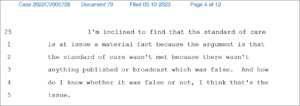By Gethin Zimmerman

Introduction
The case of Justin Beaton’s exoneration from false narratives in the 2016 Racine, WI school case has sparked a crucial conversation about media transparency and accountability. Beaton’s journey from substitute teacher to wrongfully accused individual underscores the need for responsible journalism and highlights the power of media in shaping public perception.
The Sensational News
Justin Beaton’s story entered the public eye in a seemingly rapid fashion. Overnight, he became a news headline, with his name and face plastered across news outlets and social media platforms. Beaton soon found himself embroiled in a legal battle that would threaten his reputation and livelihood.
The Rush to Judgment
As Beaton’s story gained traction, media outlets rushed to capitalize on the sensational headlines. Speculation ran rampant, with little regard for facts or evidence. In the court of public opinion, Beaton was already guilty before receiving a fair trial. The media frenzy surrounding his case exemplified the dangers of unchecked reporting and the consequences of trial by social media.
The Turning Point
Despite the overwhelming scrutiny and negative publicity, Beaton maintained his innocence of the false narratives. With the support of his legal team and newfound allies, he fought tirelessly to clear his name. In a dramatic turn of events, new evidence emerged that cast doubt on Beaton’s guilt, prompting a reevaluation of his case. Ultimately, he was exonerated of all false narratives, but the damage had almost already been done.
Media Accountability
The exoneration of Justin Beaton of false narratives in the 2016 Justin Beaton teacher case, after the facts emerged in the 2022 civil action, serves as a wake-up call for media professionals and consumers alike. It underscores the importance of transparency and accountability in journalism. The rush to sensationalize stories and the propagation of misinformation can have real-world consequences for individuals like Beaton who find themselves at the mercy of public opinion.
Lessons Learned
The Justin Beaton Racine exoneration case offers several key lessons for the media industry and society at large. First and foremost is the need for responsible reporting. Journalists have a duty to uphold ethical standards and verify information before disseminating it to the public. Sensationalism and speculation should never take precedence over truth and accuracy. Additionally, consumers must exercise critical thinking skills and approach media consumption with skepticism. In an era of clickbait headlines and viral misinformation, it is essential to question the narratives presented to us and seek out reliable sources of information.
Moving Forward
As we reflect on the lessons learned from the Justin Beaton school case, there is an opportunity for positive change. Media organizations can recommit themselves to transparency and accountability, prioritizing accuracy over sensationalism. By fostering a culture of responsible journalism, we can ensure that cases like Beaton’s are met with fairness and integrity, rather than sensationalism and speculation.
Conclusion
The exoneration of Justin Beaton in Racine, WI from false narratives serves as a powerful reminder of the importance of media transparency and accountability. By learning from the mistakes of the past and embracing a commitment to ethical reporting practices, we can reshape the media landscape and rebuild trust with the public. In doing so, we honor the individuals whose lives have been impacted by irresponsible journalism and reaffirm the media’s role as a guardian of truth and justice.
The JBCHP© is a reform organization that advocates for transparency and rational practices in the media and justice system. Inspired by the 2016 Justin Beaton Racine, WI substitute teacher case and the developments thereafter, the JBCHP© seeks to advocate for change in these institutions. The organization can be reached at contact@jbchp.org.


